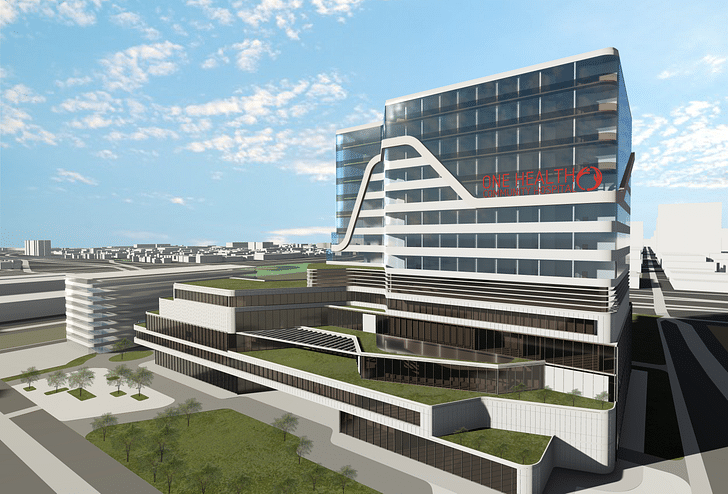

Planning for better and more integrated healthcare design has become an important topic of discussion recently. Since COVID-19 hit, perspectives and design approaches for how to improve architectural responses to disease and illness have become paramount. The University of Illinois at Urbana-Champaign M.Arch students Aparna Pillai and Ramya Pattanur Vasudevan explore how hospital design can help prepare and react to current and future epidemics and pandemics. Their thesis project, One Health Community Hospital, focuses on a multi-disciplinary approach to healthcare design while focusing on human, animal, and environmental domains.
Archinect connected with the duo as they share their experience working through the pandemic while focusing on a project that aims to engage with pandemic design approaches. The designers explain, "There are recurring patterns in the way epidemics, and pandemics hit us and how we react to them. Our response to such outbreaks has always been reactionary in nature. We convert convention centers, hotels, parking garages to field hospitals, but will that be enough?"
Archinect's Spotlight on 2020 Thesis Projects: 2020 has been an extraordinarily challenging year for architecture graduates. Students were displaced as schools shut down, academic communities had to adapt to a new virtual format, end-of-year celebrations were canceled or changed dramatically, and now these students are graduating into an extremely challenging employment market. To support the 2020 class we're launching a summer series of features highlighting the work of thesis students during this unique time of remote learning amid COVID-19. Be sure to follow our 2020 thesis tag to stay up to date as we release new project highlights.
To address the health challenges of today and tomorrow, we need an ecological, holistic design approach that is not limited to human health but also animal health and environmental well being.
Please describe your thesis.
In 2002 we had the SARS outbreak, in 2012 we had the MERS outbreak and now we are fighting COVID-19. There are recurring patterns in the way epidemics and pandemics hit us and how we react to them. Our response to such outbreaks has always been reactionary in nature. We convert convention centers, hotels, parking garages to field hospitals, but will that be enough? To address the health challenges of today and tomorrow, we need an ecological, holistic design approach that is not limited to human health but also animal health and environmental well being.
We proposed One Health Community Hospital located in Chicago, Illinois. It is a collaborative, integrated, and multi-disciplinary approach to improve health in all three domains (human, animal, and environment) rather than restricting our views and actions to just one domain. This integrated hospital consists of a dedicated veterinary hospital that runs continuous disease surveillance by monitoring animal health and an R&D facility that focuses on zoonotic diseases. With such hospitals, we hope to detect and contain the next outbreak before it becomes a global pandemic."
Our studio involved developing a new type of hospital that specialized in the detection and treatments of zoonotic diseases [...] Our professors and mentors also helped us reach out to more professionals in the healthcare architecture industry so that we could learn from their experiences.
How did your project change as studios transitioned to remote learning?
We began our final studio in January 2020 when everything was still normal here in the US. Our studio involved developing a new type of hospital that specialized in the detection and treatments of zoonotic diseases. We moved to Chicago for our final semester as our studio involved visiting and understanding various hospitals in Chicago. This was key to our studio as we were working on an Evidence-Based Design.
Less than two months into our studio, most cities in the US were recommending shelter in place to deal with the pandemic. We went from working every day from the same apartment to being in different time-zones and we soon realized that we would have to adapt to the new normal. All our in-person interactions, hospital visits became impossible. We increased the frequency of our remote meetings with our mentors since we could not meet them in person anymore. Our professors and mentors also helped us reach out to more professionals in the healthcare architecture industry so that we could learn from their experiences. One huge positive from all this was that we believe we got to meet more professionals that we may otherwise have had the opportunity to.
Since all our coursework and studios were now remote, we also had to come up with innovative ways to present our work. Instead of the standard in-person presentations using printed boards and models, we showcased our proposals in a video presentation. Again, this allows us to share our presentation with a wider audience than just our studio participants and jurors.
Any tips for students as they continue to work on their thesis?
Continuing to communicate effectively with other team members, professors, and mentors with almost everyone working from home can at times be a challenge. Figuring out what works best for you and everyone else sooner rather than later will allow you to focus on work better. Be open to new ways of collaborating with others.
With not getting to meet and talk to people on a daily basis, it’s easier to get stuck while designing. Reach out to your peers, mentors, or even other architects in the field to talk to when this happens. From our experience, almost everyone from our professors to industry professionals was very accommodating when we approached them for generic feedback or specific questions.
Katherine is an LA-based writer and editor. She was Archinect's former Editorial Manager and Advertising Manager from 2018 – January 2024. During her time at Archinect, she's conducted and written 100+ interviews and specialty features with architects, designers, academics, and industry ...
No Comments
Block this user
Are you sure you want to block this user and hide all related comments throughout the site?
Archinect
This is your first comment on Archinect. Your comment will be visible once approved.